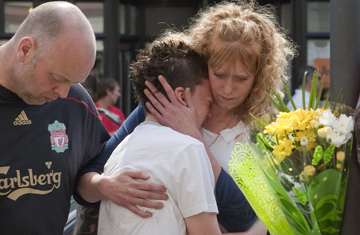
Relatives of shooting victim Darren Rewcastle mourn at a taxi stand in Whitehaven, England, on June 3, 2010
When taxi driver Derrick Bird drove through England's picturesque Lake District on Wednesday shooting dead friends, colleagues and complete strangers before turning a gun on himself, he was raining devastation on a community already steeped in tragedy. Over the past six months, the region of Cumbria, 215 miles northwest of London, has suffered deadly floods and the deaths of three people — two of them children — in a bus crash. For those who live in towns like Whitehaven, which bore the brunt of Bird's massacre, the shootings will only add to the sense that their quiet, calm lives are no protection from random, violent death. And how they deal with that will determine whether this series of awful incidents brings the community together or tears it apart.
At the taxi stand on Whitehaven's Duke Street, the railing is piled high with flowers, tributes to cab driver Darren Rewcastle, Bird's third victim. Standing by the impromptu shrine, Tracey Morley, 45, wonders at how her decision to leave earlier than usual for her cleaning job on Wednesday may have saved her life. "If I had left 10 minutes later [to get a taxi], that could've been me," she says, adding that she had known both Bird — nicknamed Birdy — and Rewcastle. "This doesn't happen around here ... It affects us even more because we're such a small community."
Police are still struggling to find a motive for Bird's rampage, telling reporters he had a clean bill of mental health, no record of antidepressant use and only one conviction for stealing some building supplies. Some who knew him speculate that maybe he snapped after a fight with family over a will or following an argument he had had with a fellow taxi driver the night before the shooting, or that the stress of an unpaid $85,000 tax bill drove him to mass murder. It's likely no one will ever find out why Bird did what he did, but the residents of Cumbria are still searching for an explanation of how something like this could happen in a county with one of the lowest crime rates in the U.K. "Whitehaven is very safe," says Michael Allister, 62, a construction worker who grew up with Bird and his twin brother — and first victim — David. "The worst that happens around here is a bar fight."
Even before Bird fired his first shot on Wednesday, Whitehaven was already in mourning. The day after the shootings, residents attended a funeral for one of the children who died a week earlier when a car and bus collided on a Cumbria highway, killing three people, including two students. "To have two major incidents in such a short space of time and we're such a small area — in a way it affects us more," says Alan Booth, 60, who works in the town registrar's office. "It's terribly tragic."
Add to that the floods in November 2009 that destroyed homes in parts of Cumbria, leaving two dead and causing $4.3 million worth of damage, and, says forensic psychiatrist Tom Fahy, the residents of Cumbria could be forgiven for feeling as though they are under assault. "That's one thing the three events have in common," says Fahy. "It's as though some outside agencies are attacking the people in that locality — forces that are extremely unpredictable, impossible to foresee and impossible to control once they've been released. It's likely to make people feel perplexed, powerless, distressed, victimized and confused. And of course, to have very strong feelings of grief."
To help the people of Whitehaven and other villages cope in the aftermath of the shootings, the National Health Service set up a number of advice sessions at a central hospital in the two days after the incident. But that can only do so much. "Events like this leave a lasting mark on the community," says Fahy. "No amount of counseling or psychology or expressions of support can negate that." In the end, the residents of Cumbria will likely turn to one another for comfort and the reassurance that one day they will feel safe again. The danger of that, says Fahy, is that the things that make Cumbria's residents feel safe — its smallness and remoteness — could be what keeps them from truly dealing with what has happened. "The downside [of a tight-knit community] could be the physical isolation of living in a rural area," he says. "There might be people who are grieving who may not really have access to the same support as people living in towns or urban areas."
After suffering so much in such a short span of time, it will take a while before people in Cumbria's towns and villages can enjoy the peace and security that they have known for so long. As locals come to terms with Bird's horrific act, it's with the sad knowledge that Cumbria's legacy is one tainted by tragedy.
— With reporting by Adam White / London
